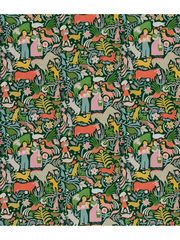Vat dye
Description
A class of water-insoluble dyes that are applied to textiles in a reduced, usually colorless, water-soluble form. Once applied, the dye is oxidized to an insoluble colored form. Natural vat dyes, such as Indigo, Woad, and Tyrian purple, have been used for at least 4000 years. The first synthetic vat dye (indigo) was discovered in 1880 by Adolf von Baeyer. In 1901, indanthrene was the first vat dye to be sold commercially. In general, vat dyes are very resistant to washing and sunlight. They are used on Cotton, Linen, Rayon, and Cellulose acetate. Other examples of vat dyes include several anthraquinone derivatives such as synthetic alizarin and Alizarin yellow.
Synonyms and Related Terms
vat dyes (pl.); carbonyl dyes; colorante a la tina (Esp.); corante de tina (Port.)
Resources and Citations
- Van Nostrand's Scientific Encyclopedia, Douglas M. Considine (ed.), Van Nostrand Reinhold, New York, 1976
- Fairchild's Dictionary of Textiles, Phyllis G.Tortora, Robert S. Merkel (eds.), Fairchild Publications, New York City, 7th edition, 1996
- Judith H. Hofenk de Graaff, The Colourful Past: Origins, Chemistry, and Identification of Natural Dyestuffs, Archetype, London, 2004
- Hoechst Celanese Corporation, Dictionary of Fiber & Textile Technology (older version called Man-made Fiber and Textile Dictionary, 1965), Hoechst Celanese Corporation, Charlotte NC, 1990
- Rosalie Rosso King, Textile Identification, Conservation, and Preservation, Noyes Publications, Park Ridge, NJ, 1985
- Matt Roberts, Don Etherington, Bookbinding and the Conservation of Books: a Dictionary of Descriptive Terminology, U.S. Government Printing Office, Washington DC, 1982
- Encyclopedia Britannica, http://www.britannica.com Comment: "vat dye." Encyclopædia Britannica. 2004. Encyclopædia Britannica Premium Service. 21 Dec. 2004 . gives date of first synthesis as 1880 by von Bayer
- Thomas B. Brill, Light Its Interaction with Art and Antiquities, Plenum Press, New York City, 1980 Comment: gives date of first synthesis as 1879 by Adolf Bayer
- G.S.Brady, Materials Handbook, McGraw-Hill Book Co., New York, 1971 Comment: p. 284
- Richard S. Lewis, Hawley's Condensed Chemical Dictionary, Van Nostrand Reinhold, New York, 10th ed., 1993
- Random House, Webster's Encyclopedic Unabridged Dictionary of the English Language, Grammercy Book, New York, 1997
- The American Heritage Dictionary or Encarta, via Microsoft Bookshelf 98, Microsoft Corp., 1998
